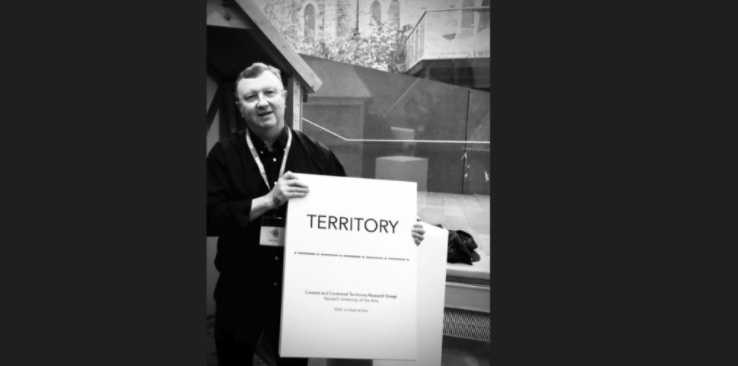The artist and curator is the 79th participant in the initiative “The Art of Balance / Pandemopraxy”, launched by Cittadellarte. Neil Powell reflects on the role of technology in the present and in the future, emphasising that “try as we do for meaning and humanity through the medium of internet and OLED, there is little doubt in most minds that deep down we all really know that this is a sterile proxy for human interaction”. This episode’s guest then talks about the impact of the pandemic on modern society: “My earnest wish is that the firebreak of Covid will not denude us of this possibility, either by creating new phobias around intimacy or that we lose the vital part of our humanity, that is to read a person’s communication in a holistic way”.
REDAZIONE, 02/12/2020

How will you communicate?
“How will you communicate?” is the question posed to me, and rightly posed to all of us in what seems, increasingly, to be a world unrecognisable to our forbearers; a world bursting with communication, yet incomprehensibly more replete with misunderstanding and shadow play disseminated through broad and narrowcast communication.
The risk in this new world (you notice I omit Huxley’s epithet ‘brave’), with its plethora of communication channels and vehicles, is that we, as a species, become swallowed by the morass of communication quantity at the expense of quality. Important to remember that the fleeting iconographies of Zoom, Twitter, Teams and Instagram are precisely 1 pixel (about 0.26 of a mm) deep. Try as we do for meaning and humanity through the medium of internet and OLED, there is little doubt in most minds that deep down we all really know that this is a sterile proxy for human interaction. I would argue that, through the miracle of digital, interaction has been superseded by transaction; if you doubt my assertion, then think back to the last time you had a speculative, rambling (and fun!) internet conversation, with the nuance, flirtation or disgruntlement of subtle body language, momentary facial expression and expressive hand gestures.
By now you are forgiven for thinking that I am some kind of Luddite or 18th Century Native American, surrendering to the fear that my soul will be stolen from me by the (web)camera, ready to dismantle the apparatus of the modern world. This is not quite the case however. But I cannot dodge the bullet of the original question any longer, and what I am getting to is that there is something irreplaceable about the integrity of meeting in person and in situ where and when this becomes possible. My earnest wish is that the firebreak of Covid will not denude us of this possibility, either by creating new phobias around intimacy or that we lose the vital part of our humanity, that is to read a person’s communication in a holistic way: the totality of the body, the flicker of emotion, the flash of anger or empathy. A few years ago, I was heartened when, on trying to open a new account at a very old family-run bank, my prospective bank manager insisted that I couldn’t open an account until he had met me and given me the once-over. He wanted to feel the dry firmness of my handshake he said. An interesting litmus.
Travel and all other life-related carbon emissions have come home to roost, and the notion of potentially meeting anyone and everyone in one’s communication orbit is rightly challenged. If anything, the 21st century indicates to humankind that the planet is finite, even if human aspirations, as represented by social media, are not. As other commentators have mentioned, there is a fundamental problem with a society or species that is essentially acquisitive/expansive at the expense not only of other species, but also at the expense of its own survival. Acquisitive capitalism, and the accompanying pathological mirage of perpetual economic growth is a short-term doomsday project; ecologically finite, or existentially necrotic – depending of course on one’s perspective/life expectancy. Social media platforms are part of the same problem: the notion that in acquiring an ever-expanding reservoir of ‘friends’ on Facebook, ‘followers’ on Twitter, or ‘connections’ on LinkedIn as an indicator of individual celebrity, or even worse, thought leadership, is entirely bogus.
With all of this in mind, the realisation has come that I, as an individual actor, need to make changes. The world cannot be my (our) oyster anymore. Whilst I intend to continue to communicate globally, I will do so more sparingly, mindful that this communication does not become a promise of anything beyond my own scale and scope, or platform (as Macluhan reminds us). This may sound an unambitious shift on my part, retrograde and provincial, but that is not the intention. It is my personal commitment to helping address the UN Sustainable Development Goals. I write this in the knowledge that my approach may prove deeply unfashionable though. As much as I hate rhetoric, or the impoliteness of answering a question with another question, ‘what will you do?’.
Neil Powell
